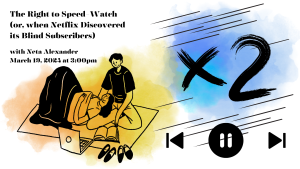Presented By: Digital Studies Institute
DSI Lecture Series | The Right to Speed-Watch (or, when Netflix Discovered its Blind Subscribers)
with Neta Alexander

Speed-watching, an understudied-yet-ubiquitous spectatorial mode, is often described by users as a productivity tool that can help them become digital “super-users.” This talk situates this emerging mode of spectatorship within longer histories of media consumption, connecting it to both efficiency and disability activism. Using Netflix as a case study, I focus on the recent public debate surrounding its failed attempt to add a playback speed feature to its streaming platform. World-renowned filmmakers pushed Netflix to shelve this idea when it was first introduced in 2018, claiming their films were not intended to be watched twice as fast. Yet, citing “requests from deaf and blind subscribers,” Netflix decided to add this feature to its interface in August 2020, when millions were sheltering-in-place due to the pandemic. This presentation asks what led to this decision, and what can the marketing discourse surrounding it teach us about how corporations monetize “accessibility.” Theorizing the difference between "time-shifting" and "time-hacking", I argue that speed-watching is a mode of survival enabling different users to advance a wide range of goals: media literacy, the thrill of speed, and avoiding a mortifying fear of boredom.
Neta Alexander is an Assistant Professor of Film and Media at Colgate University, NY and a former Assistant Editor of the Journal of Cinema and Media Studies (JCMS). Her articles have appeared in Journal of Visual Culture, Cinema Journal, Cinergie, Film Quarterly, Media Fields Journal, and Flow Journal, among other publications. Her first book, Failure (co-authored with Arjun Appadurai; Polity, 2020) studies how Silicon Valley and Wall Street monetize failure and forgetfulness. Her forthcoming book, Interface Frictions, explores how ubiquitous design features reshape users' relationships with their bodies.
This will be a virtual only event. No in-person option will be available.
Register here to attend virtually: https://bit.ly/3qXeOGe
CART will be provided. If you anticipate needing accommodations to participate, please email Eric Mancini at dsi-administration@umich.edu. Please note that some accommodations must be arranged in advance and we encourage you to contact us as soon as possible.
We would like to thank the following co-sponsors:
Department of Communication and Media
Digital Accessible Futures Lab
University of Michigan Initiative on Disability Studies
Department of Film, Television, and Media
Department of American Culture
Neta Alexander is an Assistant Professor of Film and Media at Colgate University, NY and a former Assistant Editor of the Journal of Cinema and Media Studies (JCMS). Her articles have appeared in Journal of Visual Culture, Cinema Journal, Cinergie, Film Quarterly, Media Fields Journal, and Flow Journal, among other publications. Her first book, Failure (co-authored with Arjun Appadurai; Polity, 2020) studies how Silicon Valley and Wall Street monetize failure and forgetfulness. Her forthcoming book, Interface Frictions, explores how ubiquitous design features reshape users' relationships with their bodies.
This will be a virtual only event. No in-person option will be available.
Register here to attend virtually: https://bit.ly/3qXeOGe
CART will be provided. If you anticipate needing accommodations to participate, please email Eric Mancini at dsi-administration@umich.edu. Please note that some accommodations must be arranged in advance and we encourage you to contact us as soon as possible.
We would like to thank the following co-sponsors:
Department of Communication and Media
Digital Accessible Futures Lab
University of Michigan Initiative on Disability Studies
Department of Film, Television, and Media
Department of American Culture